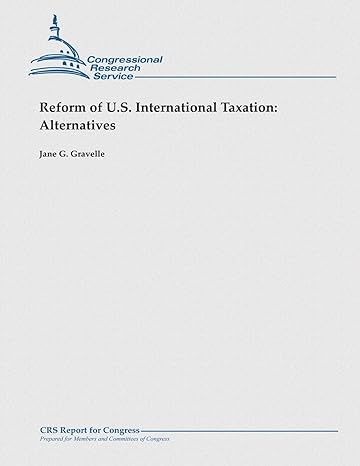Go back


Reform Of U.S. International Taxation Alternatives(1st Edition)
Authors:
Jane G. Gravelle

Cover Type:Hardcover
Condition:Used
In Stock
Shipment time
Expected shipping within 2 DaysPopular items with books
Access to 30 Million+ solutions
Free ✝
Ask 50 Questions from expert
AI-Powered Answers
✝ 7 days-trial
Total Price:
$0
List Price: $13.99
Savings: $13.99(100%)
Solution Manual Includes
Access to 30 Million+ solutions
Ask 50 Questions from expert
AI-Powered Answers
24/7 Tutor Help
Detailed solutions for Reform Of U.S. International Taxation Alternatives
Price:
$9.99
/month
Book details
ISBN: 1481923749, 978-1481923743
Book publisher: CreateSpace Independent Publishing Platform
Get your hands on the best-selling book Reform Of U.S. International Taxation Alternatives 1st Edition for free. Feed your curiosity and let your imagination soar with the best stories coming out to you without hefty price tags. Browse SolutionInn to discover a treasure trove of fiction and non-fiction books where every page leads the reader to an undiscovered world. Start your literary adventure right away and also enjoy free shipping of these complimentary books to your door.
Book Summary: A striking feature of the modern U.S. economy is its growing openness—its increased integration with the rest of the world. The attention of tax policymakers has recently been focused on the growing participation of U.S. firms in the international economy and the increased pressure that engagement places on the U.S. system for taxing overseas business. Is the current U.S. tax system for taxing U.S. international business the appropriate one for the modern era of globalized business operations, or should its basic structure be reformed? The current U.S. system for taxing international business is a hybrid. In part the system is based on a residence principle, applying U.S. taxes on a worldwide basis to U.S. firms while granting foreign tax credits to alleviate double taxation. The system, however, also permits U.S. firms to defer foreign-source income indefinitely—a feature that approaches a territorial tax jurisdiction. In keeping with its mixed structure, the system produces a patchwork of economic effects that depend on the location of foreign investment and the circumstances of the firm. Broadly, the system poses a tax incentive to invest in countries with low-tax rates of their own and a disincentive to invest in high-tax countries. In theory, U.S. investment should be skewed towards low-tax countries and away from high-tax locations. Evaluations of the current tax system vary, and so do prescriptions for reform. According to traditional economic analysis, world economic welfare is maximized by a system that applies the same tax burden to prospective (marginal) foreign and domestic investment so that taxes do not distort investment decisions. Such a system possesses “capital export neutrality,” and could be accomplished by worldwide taxation applied to all foreign operations along with an unlimited foreign tax credit. In contrast, a system that maximizes national welfare—a system possessing “national neutrality”—would impose a higher tax burden on foreign investment, thus permitting an overall disincentive for foreign investment. Such a system would impose worldwide taxation, but would permit only a deduction, and not a credit, for foreign taxes. A tax system based on territorial taxation would exempt overseas business investment from U.S. tax. In recent years, several proponents of territorial taxation have argued that changes in the world economy have rendered traditional prescriptions for international taxation obsolete, and instead prescribe territorial taxation as a means of maximizing both world and national economic welfare. For such a system to be neutral, however, capital would have to be completely immobile across locations. A case might be made that such a system is superior to the current hybrid system, but it is not clear that it is superior to other reforms, including not only a movement toward worldwide taxation by ending deferral, but also restricting deductions for costs associated with deferred income or restricting deferral and foreign tax credits for tax havens.
Customers also bought these books
Frequently Bought Together
Top Reviews for Books
Michael Washington
( 4 )
"Delivery was considerably fast, and the book I received was in a good condition."










